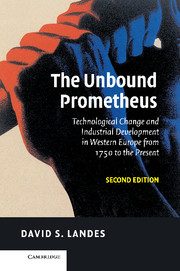 The Unbound Prometheus
The Unbound Prometheus 8 - Conclusion
Published online by Cambridge University Press: 05 June 2014
Summary
Economic history has always been in part the story of international competition for wealth; witness the literature and politics of mercantilism—or the title of Adam Smith's classic study. The Industrial Revolution gave this competition a new focus—wealth through industrialization—and turned it into a chase. There was one leader, Britain, and all the rest were pursuers. The lead has since changed hands, but the pursuit goes on in what has become a race without a finishing line. To be sure, there are only a few contestants sufficiently endowed to vie for the palm. The rest can at best follow along and make the most of their capacities. But even these are far better off than those who are not running. No one wants to stand still; most are convinced that they dare not.
The laggards have good reason to be concerned: the race is getting faster all the time, and the rich get richer while the poor have children. It took man hundreds of thousands of years to learn to grow crops and domesticate livestock and, in so doing, to raise himself above the level of subsistence of a beast of prey, however efficient. The increased food supply that this neolithic revolution provided made possible a substantial growth of population and a new pattern of concentrated settlement with specialization of labour that had the most fertile consequences for man's intellectual development. It took another ten thousand years or so to make the next advance of comparable magnitude: the industrial breakthrough that we call the Industrial Revolution and its accompanying improvements in agricultural production.
- Type
- Chapter
- Information
- The Unbound PrometheusTechnological Change and Industrial Development in Western Europe from 1750 to the Present, pp. 538 - 555Publisher: Cambridge University PressPrint publication year: 2003
